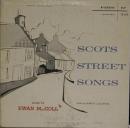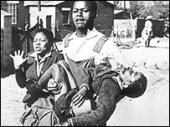Pause a while my friends and listen to what I'm going to tell to you
About the events in Dublin City and the girls of the IDATU
Dunne's stores branch in Henry street was where the trouble first began
That led to the strike, the famous strike
Of ten young women and one young man
At the union conference that year they said we should not compromise
With apartheid, and they voted to boycott all South African merchandise
Karen Guerin, and the Dunne's shop steward, told their mates about the ban
They said "We'll stick by the resolution"
Ten young women and one young man
Mary Manning, from Kilmainham, a twenty one year old cashier
Was put to the test the very next morning and she spoke up loud and clear
"No, I'm afraid, I cannot serve you. That grapefruit's South African
Some of us here are opposed to apartheid"
Ten young women and one young man
Well what a hell of a hullaballoo, the groans and threats and angry cries
The management foaming at the mouth and the suits running round like blue-arsed flies
"You'll sell that fruit or be suspended, we'll tolerate no union ban"
Little did they understand the will
Of ten young women and one young man
Mary Manning got the push, a lass of independent mind
And ten of her workmates came out and her and joined her there on the picket line
For days and weeks and months they stood there held their nerve and kept the ban
Showing the will and determination
Of ten young women and one young man
So here's to the girls of Dublin City who stretched their hands across the sea
That action surely is a lesson in workers' solidarity
Here's to the folk who heed the boycott, won't buy Cape and spurn Outspan
And to the lad who joined the lasses
Ten young women and one young man
About the events in Dublin City and the girls of the IDATU
Dunne's stores branch in Henry street was where the trouble first began
That led to the strike, the famous strike
Of ten young women and one young man
At the union conference that year they said we should not compromise
With apartheid, and they voted to boycott all South African merchandise
Karen Guerin, and the Dunne's shop steward, told their mates about the ban
They said "We'll stick by the resolution"
Ten young women and one young man
Mary Manning, from Kilmainham, a twenty one year old cashier
Was put to the test the very next morning and she spoke up loud and clear
"No, I'm afraid, I cannot serve you. That grapefruit's South African
Some of us here are opposed to apartheid"
Ten young women and one young man
Well what a hell of a hullaballoo, the groans and threats and angry cries
The management foaming at the mouth and the suits running round like blue-arsed flies
"You'll sell that fruit or be suspended, we'll tolerate no union ban"
Little did they understand the will
Of ten young women and one young man
Mary Manning got the push, a lass of independent mind
And ten of her workmates came out and her and joined her there on the picket line
For days and weeks and months they stood there held their nerve and kept the ban
Showing the will and determination
Of ten young women and one young man
So here's to the girls of Dublin City who stretched their hands across the sea
That action surely is a lesson in workers' solidarity
Here's to the folk who heed the boycott, won't buy Cape and spurn Outspan
And to the lad who joined the lasses
Ten young women and one young man
envoyé par Bernart Bartleby - 7/5/2018 - 08:16
×
![]()







Parole e musica di Ewan MacColl
In “White Wind, Black Tide”, raccolta dedicata alla lotta anti-apartheid in Sudafrica.
Testo trovato su Union Songs
MacColl compose questo brano in onore di Mary Manning e altri lavoratori della catena commerciale Dunnes Stores di Dublino che nel 1984, attenendesi ad una risoluzione adottata dal loro sindacato, si rifiutarono di vendere prodotti provenienti dal Sudafrica razzista. I lavoratori vennero immediatamente licenziati ma entrarono in sciopero, durante il quale ricevettero la solidarietà dell’arcivescovo sudafricano Desmond Tutu che proprio quell’anno fu insignito del Premio Nobel per la Pace… Il boicottaggio e lo sciopero alla fine ebbero successo: nel 1987 l’Irlanda bandì l’importazione di prodotti sudafricani.